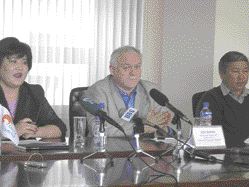Vancouver — Mongolian President Nambaryn Enkhbayar has opted for the populist course and declined to veto the recently tabled windfall profits tax aimed at copper and gold producers in the central Asian country.
Following a brief extension in the president’s 5-day window to axe the tax, optimism transformed into disappointment when Enkhbayar’s economic advisor announced that “after long and careful consideration, the president has decided not to veto the windfall tax.”
The move came even after the president reportedly acknowledged the tax was adopted in haste and that its implications should be carefully weighed by parliament, which is currently debating revisions to the country’s minerals and tax laws.
Mongolia’s parliament shocked Western mineral explorers two weeks ago when 35 of the 45 members in attendance (31 members were absent) voted to pass the tax (T.N.M., May 19-25/06), implementing a 68% levy on copper and gold operations when the metal’s prices exceed US$1.18 per lb. and US$500 per oz., respectively.
Prospective copper-gold miner Ivanhoe Mines (IVN-T, IVN-N) optimistically noted statements by advocates of the tax that it is not intended to be applied to refined copper produced from a smelter or hydrometallurgical plant. The law appears to be intended to encourage development of value-added downstream industries related to mining within the country.
Ivanhoe says it has had discussions with the government regarding possible smelter construction in Mongolia, although in the current situation, it’s a bit like negotiating with a gun to your head. Regardless, the tax would technically still apply to all gold produced from the company’s planned Oyu Tolgoi mine, with the yellow metal expected to constitute a significant credit towards projected operating costs.
The company has spent about $370 million on exploration and development of its massive Oyu Tolgoi copper-gold deposit in the far south of Mongolia’s Gobi Desert.
Centerra Gold (CG-T, CAGDF-O), which operates its 95%-owned Boroo gold mine in north-central Mongolia, is currently insulated from the windfall tax under its operating stability agreement, which expires in 2013. Centerra president and CEO Leonard Homeniuk described it as “quite an extensive agreement that fixes the taxes back to when we negotiated it.”
However, the company’s planned development at its nearby Gatsuurt gold deposit is not protected by an agreement.
“We completed our feasibility study in 2005 and had planned to invest $75 million, including improving the Boroo facility and processing the Gatsuurt ore there.” Homeniuk said, adding that the company would seek a stability agreement for the project. “We’ll see where that gets us, but under the current regime, it’s not nearly as favourable as it was before.”
Centerra anticipates it may suspend further development of Gatsuurt until an acceptable stability agreement has been signed.
Although the newly tabled law has so far only focused on gold and copper, other minerals, including coal and uranium, could be targeted at a later stage. The government is currently going into session to work out its new mining and taxation law. It is expected to review its project participation rights, the royalty structure (currently at about 2.5%) and revise licensing and permits fees.
Surprisingly, many juniors exploring in Mongolia for copper and gold fared well on Canadian equity markets following the president’s decision not to veto the tax. However, significant damage was previously done by the mid-May parliamentary edict. Ivanhoe Mines closed up 20 at $8.20 per share on TSX trading, shares of Centerra Gold rallied 16 to close at $13.15 apiece, Entre Gold (ETG-T, EGI-X) was off 8 at $1.39 per share, Erdene Gold (ERD-T, ERDGF-O) shed two pennies to 95, QGX (QGX-T, QGXLF-O) gained over 10% to close at $2.43 per share, Western Prospector Group (WNP-V) gave up 9 to $2.31 and Asia Gold (ASG-V, AGLCF-O) closed off 7% at $2.20 per share.


Be the first to comment on "Mongolian president says yes to tax"